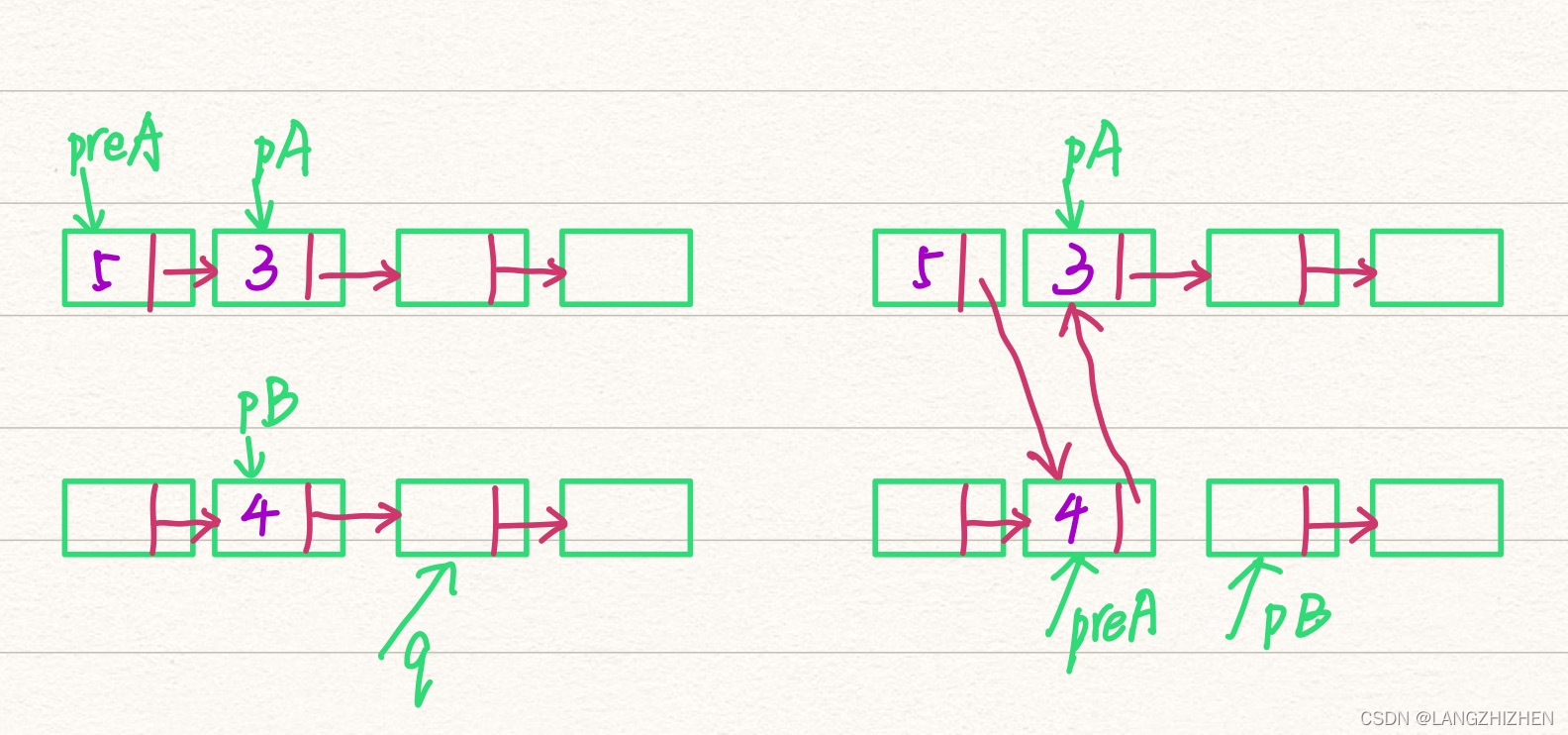这里测试用例有很多的坑
我是一点点改出来的:
- 输入的多项式正负全抵消,输出是一个0,而不是多个0
- 输入的多项式其中一个为-1,-1,即为空
- 输入的多项式两个都为-1,-1时,结果为0
我的思路是在A链表的基础上进行修改:
1.当A和B的系数相等,就直接修改A的数值
if (pA->zhishu == pB->zhishu)
{
pA->xishu += pB->xishu;
preA = pA;
pA = pA->next;
pB = pB->next;
}
2.当A的系数大于B的系数,就让A的指针往后移
else if (pA->zhishu > pB->zhishu)
{
preA = pA;
pA = pA->next;
}
3.当A的系数小于B的系数,此时B节点应该插在A节点前面,所以我们需要设置一个保存A的前驱节点的指针preA
else
{
LNode *q = pB->next;
preA->next = pB;
preA = pB;
pB->next = pA;
pB = q;
}
同时因为pB->next = pA这条语句会使原pB丢失连接,所以我们需要一个指针q来保存pB->next的连接。如图所示:

直接上代码:
#include <stdio.h>
#include <stdlib.h>
typedef struct LNode
{
int xishu;
int zhishu;
LNode *next;
} LNode, *LinkedList;
void PolySum(LinkedList &A, LinkedList B)
{
LNode *pA = A->next;
LNode *preA = A;
LNode *pB = B->next;
while (pA != nullptr && pB != nullptr)
{
if (pA->zhishu == pB->zhishu)
{
pA->xishu += pB->xishu;
preA = pA;
pA = pA->next;
pB = pB->next;
}
else if (pA->zhishu > pB->zhishu)
{
preA = pA;
pA = pA->next;
}
else
{
LNode *q = pB->next;
preA->next = pB;
preA = pB;
pB->next = pA;
pB = q;
}
}
while (pB != nullptr)
{
preA->next = pB;
preA = pB;
pB = pB->next;
}
}
void print(LinkedList L)
{
LNode *p = L->next;
bool flag = false;
while (p)
{
if (p->xishu == 0)
{
p = p->next;
continue;
}
printf("%d %d ", p->xishu, p->zhishu);
flag = true;
p = p->next;
}
if (!flag)
printf("0\n");
}
void InitList(LinkedList &L, int index[], int len)
{
L = (LinkedList)malloc(sizeof(LNode));
L->next = nullptr;
LNode *p;
LNode *q = L;
for (int i = 0; i < len; i += 2)
{
p = (LNode *)malloc(sizeof(LNode));
p->xishu = index[i];
p->zhishu = index[i + 1];
p->next = nullptr;
q->next = p;
q = p;
}
}
/**
* 输入:2 7 3 5 12 1 6 0 -1 -1
* 7 5 9 4 3 0 -1 -1
* 输出:2 7 10 5 9 4 12 1 9 0
*
* */
int main()
{
int i1 = 0, i2 = 0;
int item = 0;
int index1[200000];
int index2[200000];
while (item != -1)
{
scanf("%d", &item);
index1[i1++] = item;
}
scanf("%d", &item);
item = 0;
while (item != -1)
{
scanf("%d", &item);
index2[i2++] = item;
}
LinkedList L1;
LinkedList L2;
InitList(L1, index1, i1 - 1);
InitList(L2, index2, i2 - 1);
PolySum(L1, L2);
print(L1);
}

























 被折叠的 条评论
为什么被折叠?
被折叠的 条评论
为什么被折叠?








